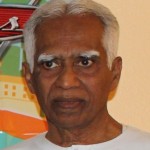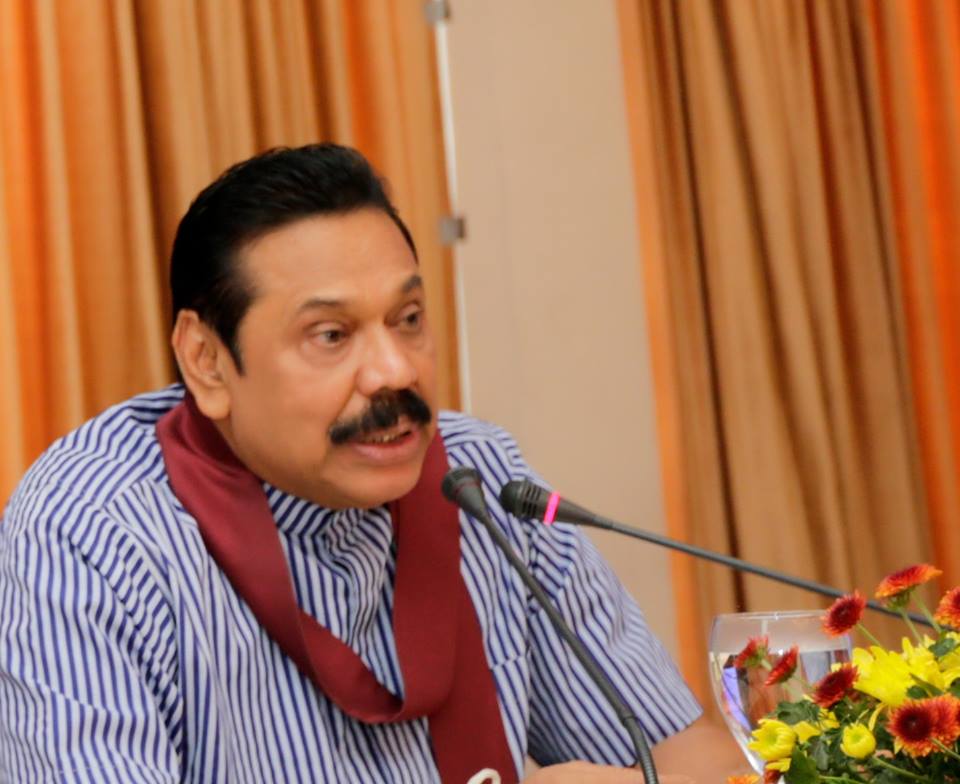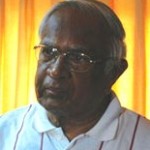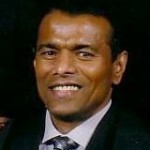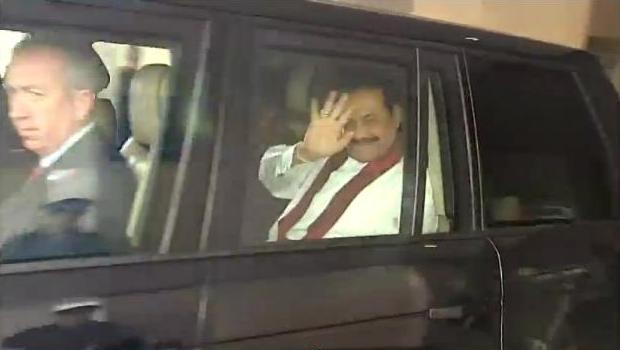A Brief Colonial History Of Ceylon(SriLanka)
Sri Lanka: One Island Two Nations
A Brief Colonial History Of Ceylon(SriLanka)
Sri Lanka: One Island Two Nations
(Full Story)
Search This Blog
Back to 500BC.
==========================
Thiranjala Weerasinghe sj.- One Island Two Nations
?????????????????????????????????????????????????Wednesday, December 31, 2014
TNA thumbs up for Maithri
- Political solution cannot be achieved through backdoor deals, says TNA Leader
- Urges Tamils to vote “enthusiastically” in 8 January election
- President squandered post-war opportunity to reach political settlement says TNA
- JHU no impediment to dealing with Sirisena on national issue says Sampanthan
- Recalls TNA engagement with Mahinda while JHU was in ruling coalition
TNA Leader R. Sampanthan (centre) gestures at the news
conference yesterday in Colombo flanked by MPs M.A. Sumanthiran (left)
and Mavai Senathiraja – Pic by Kithsiri De Mel.
By Dharisha Bastians
Making an eleventh hour decision, the Tamil National Alliance yesterday extended its fullest support to common opposition candidate Maithripala Sirisena at next week’s crucial election.
Officially announcing its support for Sirisena at a press briefing in Colombo,
Making an eleventh hour decision, the Tamil National Alliance yesterday extended its fullest support to common opposition candidate Maithripala Sirisena at next week’s crucial election.
Officially announcing its support for Sirisena at a press briefing in Colombo,
Sarath N. Silva is sorry for 2005 ruling
Former Chief Justice Sarath N Silva has apologised for the ruling he gave in support of then Prime Minister Mahinda Rajapaksa in 2005 the ‘Helping Hambantota’ case.
இவர்களில் ஒருவர் 9 கொலைகள், கொள்ளைகள் மற்றும் பாலியல் வல்லுறவு
குற்றச்சாட்டில் 37 ஆண்டுகள் சிறைத் தண்டனை பெற்றவர் எனக் கூறப்படுகிறது.
அந்த நபர், தெபேகம பிரியந்த அல்லது தெபேகம பிரியசாந்த அல்லது புச்சா என
அழைக்கப்படும் அமைச்சர் ரஞ்சித் சியம்பலாப்பிட்டியவின் இணைப்புச் செயலாளர்
எனவும் தெரியவருகிறது.
மிரிஹான விசேட பொலிஸ் பிரிவினரால் கைது செய்யப்பட்ட இந்த நபரிடம் இருந்து
ரி 56 ரக துப்பாக்கி, ஒரு பிரவுணிக் ரக கைத்துப்பாக்கி, ரி 56 ரக
துப்பாக்கிக்கு பயன்படுத்தப்படும் 22 தோட்டாக்கள், 9 கைத்துப்பாக்கி
தோட்டக்கள், ஒரு ரம்பே ரக கத்தி, இரண்டு கடவுச்சீட்டுகள், ஒரு கைக்குண்டு
ஆகியனவும் கைப்பற்றப்பட்டன.
இந்த நபருக்கு எதிராக 19 வழக்குகள் நடைபெற்று வருவதுடன் அவற்றில் 9
வழக்குகளில் குற்றவாளி என இனங்காணப்பட்ட 37 வருடங்கள் சிறைத்தண்டனை
விதிக்கப்பட்டது.
மேலும் பல வழக்குகள் விசாரிக்கப்பட்டு வருகின்றன. ஜனாதிபதி இப்படியான பல
கடுமையான குற்றவாளிகளுக்கு கடந்த காலத்திலும் பொது மன்னிப்பு வழங்கி
விடுதலை செய்துள்ளார்.
ஜனாதிபதியின் பொது மன்னிப்பு வழங்கப்பட்டுள்ளதாக கூறப்பட்டாலும் சிறைச்சாலைகளில் அது தொடர்பான ஆவணங்கள் இருப்பதில்லை.
சிறைச்சாலை புலனாய்வு பிரிவு என பாதுகாப்புச் செயலாளர் கோத்தபாய
ராஜபக்சவினால் ஆரம்பிக்கப்பட்ட பிரிவினர் குறித்த கைதிகளுக்கு ஜனாதிபதி
பொது மன்னிப்பு வழங்கியதாக கூறி வெளியில் அழைத்துச் சென்று விடுகின்றனர்.
இவ்வாறு மேலும் 17 பேருக்கு பொது மன்னிப்பு வழங்கப்பட்டுள்ளது.
ராஜபக்சவினர் மேற்கொள்ளவிருக்கும் ஏதேனும் குற்றச் செயலுக்காக இவர்கள்
சிறையில் இருந்து அழைத்துச் செல்லப்பட்டிருக்கலாம் என சிறைச்சாலை
அதிகாரிகள் சந்தேகம் வெளியிட்டுள்ளனர்.
Commonwealth to observe Sri Lanka election
29 December 2014
Dr Bharrat Jagdeo, former President of Guyana, will lead the Observer
Group, which follows a formal invitation from Sri Lanka’s Commissioner
of Elections, Mahinda Deshapriya.
Commonwealth Secretary-General Kamalesh Sharma reiterated the
Declaration of Principles for International Election Observation, to
which the Commonwealth is a signatory. He said: “Genuine democratic
elections are an expression of sovereignty, which belongs to the people
of a country, the free expression of whose will provides the basis for
the authority and legitimacy of government.”
Mr Sharma added: “Sri Lanka has among the oldest democratic traditions
in the Commonwealth. The people of Sri Lanka should be able to freely
exercise their franchise, in an enabling environment marked by
transparency, a level playing field, and adherence to the laws and norms
that govern a credible and peaceful election. For this, key
stakeholders must play their due roles.”
The Group will consider the pre-electoral environment and preparations.
On election day and thereafter, members will observe the voting process,
counting and tabulation procedures and the announcement of results. The
Group will act impartially and make an independent assessment of the
electoral process. It will conduct itself according to the standards
expressed in the International Declaration of Principles for Election
Observation to which Sri Lanka has committed itself.
Upon completion of its assignment, the Group will submit its report to
the Commonwealth Secretary-General, who will in turn send it to the
Government of Sri Lanka, the Commissioner of Elections and the principal
political parties, before making it available to all Commonwealth
Governments, and eventually releasing it into the public domain.
The nine Observers will be in Sri Lanka from 2 to 14 January 2015. A
five-member team from the Commonwealth Secretariat, led by Ms Katalaina
Sapolu, Director of the Rule of Law Division, will support them.
The full composition of the Commonwealth Observer Group is:
Dr Bharrat Jagdeo (Chair)
Former President
Guyana
Ms Maria Chin Abdullah
The Coalition of Free and Fair Elections
Malaysia
Dr Campbell Gordon Calder
Former Member of Parliament
New Zealand
Mr Qamar Zaman Kaira
Former Minister and Member of Parliament
Pakistan
Mr Eldred De Klerk
Rule of law and elections security expert
South Africa
Dr Sally Kosgei
Former Minister and Member of Parliament
Kenya
Ms Sa-adatu Maida
Election Commissioner
Ghana
Mr Brij Bihari Tandon
Former Election Commissioner of India
India
Ms Lainy Malkani
Media Expert
United Kingdom
For media enquiries, please contact Victoria Holdsworth on v.holdsworth@commonwealth.int or +44 (0) 789 459 3520.
-
See more at:
http://thecommonwealth.org/media/press-release/commonwealth-observe-sri-lanka-election#sthash.n33KaztV.GBrkZlYB.dpufTen Days That Can Subvert Democracy

“The philosophers have only interpreted the world, in various ways. The point, however, is to change it.”- Karl marx.
Lenin changed it. In 1917 John Reed saw it, “with the eye of a
conscientious reporter” as he puts it. “A slice of intensified history”
he calls it so aptly. With the same intensity, the flow of Sri Lanka’s
history may get perverted. Ten days from tomorrow are enough for it.
International vigilance can thwart it. The country is alive to it, but
remains unprepared. Danger is from the incumbent President, his coterie and his familial regime.
The caption of this article is with reference to Sri Lanka. It is in the
same vein as John Reed’s ‘Ten Days that Shook the World’. It is phrased
advisedly. Though confined to a small nation, it can escalate to earth
shattering proportions. To the polity the eruption may even be volcanic.
Signs are ominous and many have sensed it. Ceylon and later Sri Lanka
never before stood so precipitously on such unpredictable terrain.
Ten Days in 1917
The allusion is to ten decisive days of
the Russian Revolution. As the first successful Communist upheaval it
was epoch making. The book too was same. Lenin wrote in the introduction
in 1919, “With the greatest interest and with never slackening
attention I read John Reed’s book …”Lenin with his sense of history took
the title as appropriate.Read More
Postwar Sri Lanka’s Awkward Peace
- Wednesday, 31 December 2014
 Sri
Lanka — Two men were riding the train known as the Queen of Jaffna as
it rattled through the haunted battlegrounds of Sri Lanka’s civil war.
Sri
Lanka — Two men were riding the train known as the Queen of Jaffna as
it rattled through the haunted battlegrounds of Sri Lanka’s civil war.
One of them, Nisal Kavinda, a 20-year-old man from the Sinhalese ethnic
group, was jubilant. He had wanted to ride this train since 2009, when
President Mahinda Rajapaksa declared victory over separatist rebels in
the Tamil north, an event he called “the most happiest thing in our
lifetime.”
Coutesy - http://www.nytimes.com
The Battle Lines

“Maithripala’s impure alliance must be defeated.”
Galagoda-Atte Gnanasara Thera
( December 31, 2014, Colombo, Sri Lanka Guardian) It may not measure up to any ideal. But given the Lankan condition, it may be the only possible alliance of moderates.
A key problem with the Common Opposition was that, for a while, it
looked too much like the common Southern opposition. True, most of the
minorities, alienated by Rajapaksa extremism, were likely to vote for
Maithripala Sirisena. But at the party-level, there were no minority
stakeholders with sufficient gravitas in the opposition camp.
Presidential Election 2015 & The Tamil Voter: We Need Change For Democracy


[Militarised Jaffna, the Tamil heartland]
by Sivamohan Sumathy-31/12/2014
 What
is striking about the 2015 elections? It is the upsurge in the call for
democracy and the call to put an end to aggression, arbitrary actions.
Significantly, it has opened up spaces for the minority community, the
minority voter, to once again find a voice within the politics of the
state.
There is a resounding call for democracy today. A very clear message has
been sent to the powers that be that one cannot be arrogant about power
and resistance will always emerge from some quarter. The space for
democracy has widened. People are speaking openly, acting openly, and
giving voice to their aspirations.
What
is striking about the 2015 elections? It is the upsurge in the call for
democracy and the call to put an end to aggression, arbitrary actions.
Significantly, it has opened up spaces for the minority community, the
minority voter, to once again find a voice within the politics of the
state.
There is a resounding call for democracy today. A very clear message has
been sent to the powers that be that one cannot be arrogant about power
and resistance will always emerge from some quarter. The space for
democracy has widened. People are speaking openly, acting openly, and
giving voice to their aspirations.
Presidential Election 2015 & the Tamil Voter We Need Change for Democracy by Thavam Ratna
[Militarised Jaffna, the Tamil heartland]
by Sivamohan Sumathy-31/12/2014
 What
is striking about the 2015 elections? It is the upsurge in the call for
democracy and the call to put an end to aggression, arbitrary actions.
Significantly, it has opened up spaces for the minority community, the
minority voter, to once again find a voice within the politics of the
state.
What
is striking about the 2015 elections? It is the upsurge in the call for
democracy and the call to put an end to aggression, arbitrary actions.
Significantly, it has opened up spaces for the minority community, the
minority voter, to once again find a voice within the politics of the
state.
There is a resounding call for democracy today. A very clear message has
been sent to the powers that be that one cannot be arrogant about power
and resistance will always emerge from some quarter. The space for
democracy has widened. People are speaking openly, acting openly, and
giving voice to their aspirations.
Presidential Election 2015 & the Tamil Voter We Need Change for Democracy by Thavam Ratna
Presidential Election 2015 & the Tamil Voter We Need Change for Democracy by Thavam Ratna
The Hybrid Features Of The Present Constitution Must Be Removed

The most important feature of the Executive Presidential form of
government which distinguishes it from the Westminster form is that the
Executive is separated from the Legislature and the Judiciary and the
separation of powers is followed down the line. It is not only the
Executive President who is separated from the Legislature. It includes
all his Ministers as well. The Executive President appoints his
Ministers from outside the Legislature – the Parliament. This is seen in
the U.S Presidency. In France which also follows the Executive
Presidency Ministers can be appointed from Parliament but they cease to
be voting members in Parliament although they could sit in Parliament.
President J.R J with
all his political maturity and experience failed to appreciate the need
for a strict separation of powers to safeguard freedom. He adopted the
practice of appointing only Members of Parliament as his Ministers and
they continued to exercise their votes in Parliament. This gave the
opportunity to MR to
buy over all the MPs in Parliament by appointing them as Ministers
ignoring the administrative rationale for the appointment of Ministers.
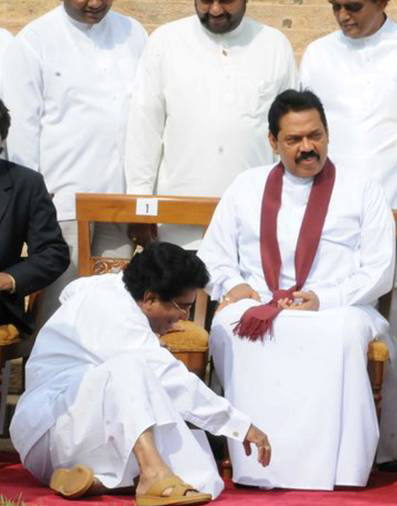 President
J.R J crated a hybrid form of government unknown to political science
in a liberal democracy. He thus dropped the principle of separation of
powers and failed to adopt the principle of drawing Ministers from
outside Parliament which gave the President the choice of appointing
competent Ministers with administrative experience and modern knowledge.
These are the indispensable features and advantages of the Executive Presidency.
President
J.R J crated a hybrid form of government unknown to political science
in a liberal democracy. He thus dropped the principle of separation of
powers and failed to adopt the principle of drawing Ministers from
outside Parliament which gave the President the choice of appointing
competent Ministers with administrative experience and modern knowledge.
These are the indispensable features and advantages of the Executive Presidency.
Why is it necessary to have competent
Ministers and can we obtain them by confining the selection to MPs?
Because modern government is complex. This point was explained by
President Wilson to justify the scrapping of the spoils system in USA
where officials were appointed on political patronage. It was abolished
in 1883. Persons who are appointed as Ministers should have a knowledge
of modern economics science and even modern technology. They must also
have experience in managing a large enterprise. Do our elected MPs have
such knowledge and management experience? Most of them lack modern
knowledge since in 1956 the country sought a revival of our ‘glorified’
traditional past. English as a medium of instruction was done away with.
Language is not only a mode of communication and learning but also
transmits social moral and cultural values. So we lost the understanding
of liberal values and ignored their historical development through the
1688 Glorious Revolution in England and the 1789 French Revolution. We
have failed to instruct the youth in these values and instead a half
baked Marxist doctrine is imparted. So the JVP still believes in Marxism
despite its failure and abandonment in Russia and China which have
opted for free market economies or Capitalism. Our politicians are from
rural backgrounds ignorant of modern knowledge. Are such MPs suitable
for appointment as Ministers in a modern State?Read More
Mahinda concedes defeat: parliament to be
dissolved on 8th or earlier!
- Wednesday, 31 December 2014
 President
Mahinda Rajapaksa is frightened by the rising people’s power against
him, and sources close to him are reporting the acts he is planning to
do in his rage of defeat.
President
Mahinda Rajapaksa is frightened by the rising people’s power against
him, and sources close to him are reporting the acts he is planning to
do in his rage of defeat.
Accordingly, parliament is to be dissolved on January 08 or earlier. The
president is intending that that will prevent Maithripala Sirisena from
gaining a 2/3 parliamentary majority.
Dissolution of parliament is also aimed at sabotaging the implementation
of Maithripala Sirisena’s election theme of ‘a new country in 100
days.’
The president also hoping that a dissolved parliament will prevent
Maithripala Sirisena and Chandrika Kumaratunga from gaining control of
the SLFP. He is to take this decision by disregarding the pension
entitlement of MPs in the present parliament, who are eligible to draw a
pension only if their term extends up to end-April 2015. He also wants
to build a strong opposition and fight back.
Sri Lanka: Rajapaksa’s Eelam Delusion
 | by Nilantha Ilangamuwa
| by Nilantha Ilangamuwa
( December 31, 2014, Colombo, Sri Lanka Guardian) We
were all ‘happy’ when the long term civil war which nearly destroyed the
country, came to end in 2009. We all applauded despite the fact that it
left thousands of civilians dead that even today, cry out for justice.
Despite the general jubilation at the end of the war there was one man
who was not quite so happy. The war was a cause for fear that he was
happy to use to justify extra-judicial methods of law enforcement. And
with the cessation of hostilities he had to find another source of
‘fear’ to justify his means.
Of course, he never actually stated this in public but was happy to
‘suggest’ the possibility of renewed violence to grab votes. This man is
now suffering internally and no one would be surprised at any ploy he
comes up with to demoralise the public and increase the fear of the
unknown, which, he believes will gain him the votes needed to remain in
power.
He is, of course, none other than the Mr. President Mahinda Rajapaksa,
who is testing his fortunes in next month’s Presidential election in the
country, eying a third term, by calling for an early election.
However, what is emerging in the political situation in the country is
that Rajapaksa is losing his moral and ethical power. Mr. Rajapaksa is
rapidly turning into the most destructive and abusive villain of
history. There is nothing he will not do to the people of his country in
order to stay in power.
Meanwhile, a great political alliance is addressing the real issues of
the general public and turning the political discourse into a new
debate. It is making inroads in the public conscience.
Under these circumstances, defeat can be long-term relief to the President and his clan.
It was one of most important meetings that the common candidate held
yesterday morning in Mannar where he met Mannar Bishop Rt. Rev. Rayappu
Joseph, a one of outspoken priests of the Church. Because of his views
he was labeled as a national traitor who was fuelling separatism.
Despite the importance of the meeting only a few inches were given by
the local printed newspapers. Little attention was given to the
conversation and the points he raised with the common candidate.
However, one of local language newspapers, Divaina was able to
grasp the basic points in brief. In the discussion, according to the
report, the Bishop denounced the claimed which most of opponents brought
against him as an advocator of Eelam.
“I never demanded Eelam. What is the Tamil people are expecting is to live in peace and harmony with equal opportunities in the unitary state,” the bishop made an important statement before the common presidential candidate.
In his response the common candidate Mr. Maithripala Sirisena said, “My
expectation is to ensure the Sinhalese, Tamil, Muslims and all people
live with dignity under the good governance of the unitary state in our motherland”.
Those two quotations are not merely political remarks but the serious
outcome of the healthy discussion between both represents parties.
There is no doubt but this is something to brag about. In other words
this is the beginning of the healthy discourse and a line of real
reconciliation.
This is what President Rajapaksa has been blind to and actively avoided
understanding the ground reality. When a person loses contact with the
ground reality, it is only natural he will delude himself by creating
his own ‘realities’. What he has created, however, is his own personal
nightmare.
No one can deny that the Rajapaksa is having the devil dance of the end
game of abusing power. He is on the road where the leaders like Marcos,
Suhartho travelled.
However, thanks to our former leaders who created the situation in which
the President is above the law, therefore the incumbent may yet have
loopholes to avoid defeat. He has already removed the backbones of the
state institutions and he has further distorted the system to get rid of
the real battle.
Is he going to leave the office as a defeated leader or will he
attempt another “humanitarian operation” to solve the “internal
disturbance” like what the late Prime Minister Indira Gandhi did in
1975?
The answer will be delivered soon.
According to Polls (Between Dec 18-23) Maithripala Is Ahead Of Rajapaksa
by Vishwamithra 1984-30/12/2014
One more week for the Presidential Elections. The people of Sri Lanka
are being asked to make a decision and it’s going to be the most crucial
political judgment they have been challenged to make.
Down to the wire
Jan 3rd 2015
Now his prospects look far less certain. The campaign has been marked by
a series of defections by former allies who call him authoritarian and
nepotistic (among relatives in important political jobs are a brother,
Basil, who is in charge of running the economy; another brother,
Gotabaya, who is defence secretary and a third, Chamal, who is
parliamentary Speaker). Most striking was the exit of Maithripala
Sirisena. He was both health minister in Mr Rajapaksa’s cabinet and
general secretary of his Sri Lanka Freedom Party (SLFP). On November
21st he became the main opposition candidate. The president complains
bitterly that Mr Sirisena dined with him only the night before.
Mr Sirisena, at 63, is six years younger than the president and has
spent four decades in politics. In a country where a spell in jail is
often a badge of pride, he can also point to 18 months behind bars
(beating Mr Rajapaksa’s stint of three months). He appeals especially to
rural voters: he calls himself a farmer, speaks only Sinhala and has
said he would govern from the agricultural heartland of Polonnaruwa.
He is thus popular within the Sinhala Buddhist majority that was once
solidly behind Mr Rajapaksa. Mr Sirisena promises sweeping changes
within 100 days, including constitutional amendments; the end of
corruption; energy security; even a “moral society” without drugs,
liquor or cigarettes. He can point to support from prominent political
figures, including a general who was defeated by Mr Rajapaksa in the
last election in 2010. Mr Sirisena is backed by nearly 40 political
parties and groups, notably the main opposition United National Party
and some from the ruling United People’s
Freedom Alliance, of which the SLFP is a member. Of the alliance’s 161
parliamentarians, 23 have defected to his side. If others are included
who have switched allegiances at provincial and local levels, the
defection rate in this campaign has been among the highest seen in any
election in Sri Lanka.
For Mr Rajapaksa, a heavy blow was the departure from the alliance of
the Jathika Hela Urumaya, or National Heritage Party, which counts many
saffron-robed Buddhist monks among its Sinhala nationalist members. On
December 28th the Sri Lanka Muslim Congress also defected, saying Sri
Lanka needed to be better governed. The Tamil National Alliance, an
opposition group that is normally at odds with the Sinhala majority,
says everyone should vote for Mr Sirisena. It accuses Mr Rajapaksa’s
government of having been “particularly harmful to the well-being of the
Tamil-speaking peoples of Sri Lanka”.
Mr Rajapaksa thus looks squeezed. Muslims and Tamils together make up
nearly a quarter of the 21m-strong population. Muslims are furious at
the Bodu Bala Sena, or “Buddhist Power Force”, which is avowedly
anti-Muslim and supports the president’s re-election.
The president’s campaign promises include universal housing,
development, industrial growth and jobs. He vows to defeat drug and
other gangs. He also says he will not let anyone who fought the
Liberation Tigers of Tamil Eelam, a rebel organisation that was crushed
in a military campaign by his government in 2009, “answer to any
international judiciary or tribunal”. His ending of a long civil war
that year, by defeating the Tigers, is still his strongest electoral
asset; he has been flogging it heavily to everyone but the Tamil
northerners (they are told instead to be grateful for better roads and
railways). To stir nationalist support, he invokes conspiracy theories.
Supposedly Mr Sirisena’s campaign is backed by the West who want to
replace a strong leader with a “spineless puppet”, though no proof of
Western meddling is ever offered.
Mr Sirisena’s rallies draw huge crowds—as do the president’s, even if
most of Mr Rajapaksa’s supporters are ferried to them on public buses.
With his frequent use of state-run media and official vehicles to help
his campaign, Mr Rajapaksa looks increasingly jittery. His eldest son,
Namal Rajapaksa, even invited Bollywood actors to add glitz to the
re-election bid. All the signs are that this will be the closest
presidential race yet.
President Rajapaksa: Man With Credibility Completely Lost

Once a man has lost his credibility, in law, no weight whatsoever would be placed on any utterances made by him.
In his 2005 Election Manifesto Rajapaksa, when campaigning for the
Presidency for the first time, with full support of the JVP, promised to
the people to abolish the Executive Presidency (page 97 – 2005
manifesto). Now the very person promises to do the same, within one year
in the event of his re-election to Office for the third time (page 17 –
2015 manifesto).
Will any prudent person take any notice of this promise?
Then again in the 2010 manifesto, when contesting for the second term,Rajapaksa promised
to take ‘whatever measures’ needed to eliminate frauds, corruption and
malpractices. But what he did in practice was completely the opposite.
For instance he made the Auditor General
redundant and irrelevant. For the last few years the Auditor General has
not been able to audit public offices and publish its annual report, as
no one seems to be taking him seriously. This disrespect to the office
of the Auditor General has opened floodgates for mass scale corrupt
practices running into billions of rupees.Read More
Subscribe to:
Posts (Atom)

.jpg)


